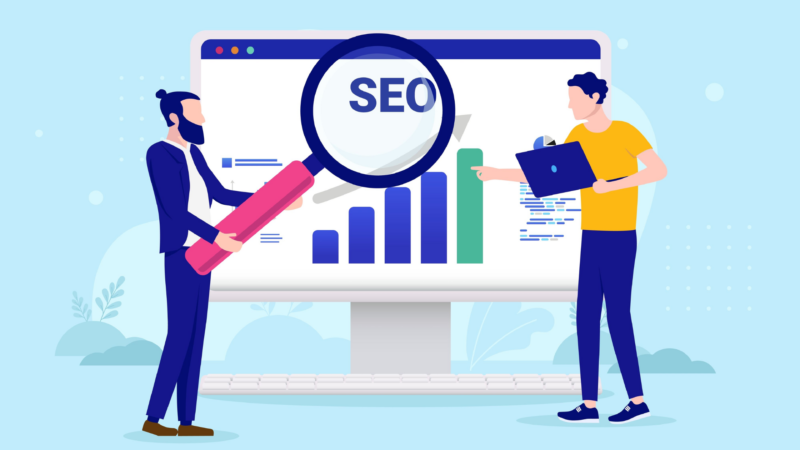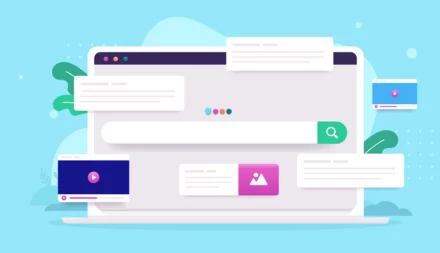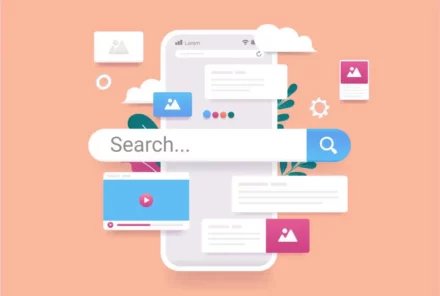Why You Need In-House and Agency Expertise to Drive SEO Success

Having the right blend of in-house SEO and agency support is pivotal to getting the right type of results on your search efforts.
On our recent webinar, Why You Need In-House and Agency Expertise to Drive SEO Success, Joe Griffin, Senior SEO Manager at BT joined Scott Donnelly, QueryClick’s Digital Strategy Director, to explore the topic in more detail and consider some key questions including:
- why in-house versus outsourced SEO doesn’t actually have to be an and/or situation
- the benefits of combining your in-house and outsourced SEO capabilities
- how to make that blended SEO approach really work for you
Here is what they had to say.
Watch the webinar: Why You Need In-House and Agency Expertise to Drive SEO Success
The traditional agency-client relationship
Scott opened the webinar by touching a little bit on the traditional agency and client approach because it is that type of integration that we are particularly interested in. It’s important to say upfront that there’s nothing wrong with traditional agency and client approaches, but sometimes there are challenges that do come with them.
Here are a few that we come across ourselves.
Resourcing
Problems around resourcing are a common theme, but this issue often appears in different guises within different businesses when it comes to dealing with SEO.
In some instances, we find ourselves working with a single client contact who covers multiple channels. This tends to mean that the client resource is often spread too thin and has too many plates spinning.
In this type of scenario, sometimes SEO doesn’t become the priority. But this is something that agencies can support with. And it does require a degree of autonomy which means things can get done but they don’t always need to be put into action.
Additionally, unlike many digital marketing channels, SEO is a resource intensive channel both in terms of the agency delivery – because, it’s all about the man hours and not the media spend – but also on the client side.
So, for example, improving SEO means we need to make changes to the site itself which often means we’re dealing with multiple stakeholders and really trying to find ways to fit in with the existing workload on this.
This is especially true when it comes to things like technical SEO, which means getting those SEO issues into the backlog and prioritising them into development sprints.
Knowledge and understanding
Secondly, knowledge and understanding is another key challenge that we often face when working with clients when it comes to SEO, especially if they don’t have a dedicated SEO resource in-house.
How this tends to manifest itself is that our day-to-day contacts do understand SEO but the wider business tends to not maybe necessarily have the adequate level of SEO knowledge or truly understand the value that it brings. Which ties in really closely with the resource issue where development resource, for example, can be incredibly tight.
This can make it really difficult to get SEO issues prioritised into that backlog because SEO can often be mislabelled as “free traffic”.
So, while SEO is not a CPC channel, investment does need to be made in order to get a gain clicks, gain visits and ultimately gain improved performance.
Building the knowledge and appreciation for SEO internally is a true challenge.
And, while things like training sessions can be run to boost knowledge, establishing a culture of SEO proponents within your business is much more difficult. Especially if you don’t have a sizable in-house SEO function.
Q&A Session between Scott and Joe on agency/client working
In the next section, we cover off the Q&A session that took place between Scott and Joe which focused on benefits and the ways of working with an agency to supplement in-house capability.
Q. What is your experience of working with agencies like in your roles to date?

So actually, it’s the first time I’ve headed up an SEO function where I’ve actually worked with an agency.
So, say I can say QueryClick is the best agency I’ve worked with! But in all seriousness, I was always a little worried about coming to a role working with an agency because I’ve never done it before. And from experience I’ve always had aggressive approaches from agencies where it was something like ‘this is what’s wrong with your website’ and I always felt it was questioning my skills and my judgement.
But straight from the off working with QueryClick, it wasn’t a case of anyone stepping on toes or wanting to muscle in – and “these are our recommendations’ and we’re claiming this work”. QueryClick are very much an extension of the SEO team at BT.
So, it’s about working in collaboration and building a good relationship and trust across the board.
That’s how I find it, which means I have transitioned from being worried about having toes stepped on – and taking claim to work (and perhaps putting myself out of a job) to everyone supporting each other. And it’s about that end goal and ‘bigging up’ the SEO function in-house. I find it great working with an agency and it provides a massive support network.
Q. What would you say is the biggest benefit you get from having the QueryClick team at your disposal to help with the SEO offering?









I think it’s the varying expertise across the board.
So, we’ve grown our team out recently. In the last year, we’ve doubled in size but where there were knowledge gaps, and even now still where perhaps there are those knowledge gaps in house, there’s someone at QueryClick who will fill that gap. Whether it’s a technical perspective, content experts and drawing on previous experience from other clients as well. Something that might have worked for a previous client, is perhaps something we haven’t considered. It’s just drawing on all that knowledge and using our resources as best we can.










Yeah, absolutely. I think that is the balancing act. I think that’s where the benefit of having agency support really does come in. Because you know that everybody doesn’t know everything.
SEO is such a multi-disciplined channel. And you have areas of expertise, whether it be content, whether it’s technical seo, whether it be things like link acquisition and digital PR.
Having one person to try and do all of that within a business is very difficult.
Whereas obviously, with the agency side, you get access to those different levels of expertise. But I think that’s also something you’re building out within BT, that kind of wider team that, as you’ve grown over the last couple of years, you’ve started to add in those capabilities internally as well. But I suppose we talked about some of the benefits of it, but some challenges still remain in terms of getting things done.
Looking for an SEO agency? Get in touch with QueryClick >>
Q. What would you say is the biggest challenge that you face at BT in terms of getting SEO actions through for example?









So, I think based on projects I’m working on at the minute, the hardest thing is trying to educate the wider business around SEO – and the benefits of SEO. And what we’re trying to do.
SEO is very much seen at BT as a ‘nice to have’ when, essentially, we want to try and educate people that it’s fundamental to the success of things like editorial content and consumer journeys. So, it’s just about moving that viewpoint and educating the business that it’s not just ‘nice to have’. It’s fundamental and critical to our success.
That’s why sometimes when we’re briefing work, it’s perhaps not taken as seriously – or it hasn’t in the past. This has certainly improved in the last 12 months, but I think it’s just around the education and really proving the worth of SEO.
So, we’re very conscious now that when we do a piece of work that is successful, we shout about it from the rooftops. We present it at our big, digital all hands meeting that we have. We get in front of the directors and we’re sending it up the chain of command. Just to showcase what SEO does and the benefit it can have.
So, I think that’s why it’s been a struggle to get things implemented because people haven’t perhaps considered the importance of it because it’s perceived as a ‘free channel’.










We sort of touched upon that a little bit earlier, but that is a common misinterpretation of SEO. It’s seen as ‘these clicks are free’ and we don’t pay for them and that traffic is coming through to us.
When, in reality, all of us involved in the industry and involved in the channel know that’s not the case.
But I think, we talked about getting that in-house education piece in place as well. And I know that is something that you have been striving to work towards.
Q. What’s the approach that you’ve taken to try and really broaden that knowledge of SEO within the business. And get that buy-in, beyond just sort of sharing some of the results, as you mentioned?


I think there are a number of ways:
- Visibility at meetings – we’ve always made sure we’re really visible in meetings. We always try to have an SEO representative within meetings and that stretches to QueryClick as well. So, we always try and get someone from QueryClick onto these meetings – just so there’s nothing misinterpreted when we’re communicating those things back.
- Lunch and learns – we’ve been very good at setting up lunch and learns. So, going onto these stand-ups and presenting work and sharing Google updates when there is a bit of news. But, also, QueryClick actually lead our training – so we do half day training sessions, where we’ve worked with them to produce decks using real time issues with improvements we’ve made to the website.
- SEO onboarding training – One of the ways that we’re now moving on to the next level of SEO education is I’m working with our onboarding team at the minute to make sure that any new starter has to go through some basic SEO training. As part of their introduction to the new role. So, we have mandatory training that you have to do, where you learn about areas of the business and how certain functions work. SEO has never really been part of that. So, we have set up an introduction to SEO which is an hour of their time where they learn the absolute fundamentals of SEO.










Yeah, I think that broader training piece is absolutely key.
It’s also about integrating it. Making people understand that, actually, anything that they’re doing with the website can – and probably will – have an effect on SEO. And, therefore, it has to be a fundamental consideration in everything that they’re doing.
Whether you work in UX, content, design or whatever your job title may be – if you’re putting anything on that site, SEO is a core function. And knowing that and how to work closely with the team internally and us as well. So that collectively, we’re going to be able to drive that success.
Q. How do you judge success when you’re looking at the kind of SEO projects that you work on with us. And internally, what constitutes a great win for BT SEO?









Sure, it’s a good question. And perhaps as an SEO team, we might judge our KPIs differently to what the business does.
So certainly, I will talk about the success of the implementation. The fact that we have managed to get that implementation delivered and how we work with the other teams to get that done. But I suppose at the end of the day when you implement some SEO work, you want to move the needle. So first and foremost, we look at has the project had a positive effect on traffic or rankings. Are we sending more users to the website and getting eyes on the products from certainly either a branded perspective or non-branded.
But at the end of the day, whenever we can shout from the rooftops we’ve done things and it’s driven an extra million clicks just from things we’ve suggested and the SEO work we’ve done well. The nuts and bolts of it for the business is what’s the revenue? What’s the sales? That’s what the Directors care about.










Quite often, SEO becomes a consideration for people, when they’re more commercially minded. When traffic declines really rapidly and they don’t know when or where it came from.
I think that’s a really interesting point, though, as well. Because for SEO, it’s obviously a traffic acquisition channel. And it’s a route for getting customers to the site.
Part of that, for me, has always been about making sure we get the right customers as well. So obviously, tying through to conversion. And I think that’s where having that integrated relationship with wider parts of the business always helps as well. So, working with CRO or UX teams in order to understand what are we doing? And to try and make that traffic work a little bit harder to ultimately convert. Because if you’re driving a million clicks to the site but it’s not doing anything then it’s hard to justify that to the business.
But if they can see that that traffic is actually leading to sales. And leading, ultimately, to conversion. Then you can tie up a really nice story. One that really shows the true value of SEO. You know, it’s predominantly the largest traffic driver for most sites.
So, therefore, it is important – and it really has got to become a focus.
Related: How to Acquire More Customers With Less Budget
Q. What advice would you give on how to go about building an SEO function?









Before BT, and then initially when I came into BT, I’ve always been a one-man band. That’s just been sort of how it was, not my choice or anything like that. So, I’ve always had to use my resources to build out my own knowledge.
But I think one piece of advice is – don’t be scared of admitting there’s a knowledge gap sometimes. So, I’m not amazing at technical SEO for instance. So, there was a gap. And I leaned on Query Click a lot on in the early days for the technical solution and then the content. So, when you are building out your internal team, I think just address what the knowledge gaps are. Where you think the extra resources needed and the type of person that you would want to fill that. For me, working with QueryClick, you’ve got a couple of really good technical guys. I use their level of knowledge as my base. I’d also like someone as good as those when it when it comes to recruiting.
II think, embrace that there is a gap. And acknowledge what your gap really is when putting that team together.










That makes perfect sense and I think that still rings true especially if you are a one- man band in-house. If you are doing that and if you are looking for agency support.
You mentioned earlier something around, are they going to second guess and think ‘why are you bringing in an agency because you can’t do your job’.
But the reality of that is the skill sets are so vastly different.
The technical SEO that you’ve just mentioned requires a much different level of knowledge than content writing, for example. And the two skill sets are actually very difficult to find in a single individual. There are very few SEO unicorns out there who can do everything to a world-class standard.
But I think that’s where the advantage of having that in-house function, and an agency really does come to light. It’s about complementary skill sets.
We do all areas of SEO for BT so technical, content, etc. But in some instances, you may just need someone who’s got that technical head. Or you may just need an agency that can come in and help you with content. And that’s it.
Agencies will have people on their staff who are absolute experts at that. And, therefore, you can bring in that expertise from an external supplier to supplement the work that you are doing.
And I think that’s the biggest thing. As a performance marketing agency, we obviously have clients, we call them clients but really we want partners. We really want to be an integrated part of our clients’ teams.
Because, actually, we know the more we’re invested in you and working with your team, then obviously your successes are our successes. And, actually, that kind of communal success is excellent. It really drives people and I think that, for me, is one of the reasons why the BT relationship with us is so strong. Because when we do something great, you guys are our biggest proponents. But likewise, when you guys do something great, we shout and share about it as well.
So, I think that’s the kind of relationship you want with an agency and client situation. Because if you’re all pulling in the same direction, then that’s by far and away the best.
And it doesn’t always happen. Obviously, you mentioned you’ve never worked with other agencies in previous roles, but at times it can be difficult. And I think the biggest challenge there is that knowledge gap that you mentioned. People not knowing what SEO is, why it’s important or why we’re trying to do the things that we’re trying to do. So, getting that education in place is absolutely key.
Q. Where do you see the SEO team in the next couple of years?









I think the SEO team has got to grow because we have a very, very stretched capacity – even with agency support.
As a business, we’re getting involved with more products and more verticals as well. So, whether we need to start appearing as experts in certain areas, the SEO team has naturally got to grow to cope with the capacity needed to make SEO a success in those new verticals.
And, so, you’re very conscious of hiring people that have perhaps worked in those areas before so we can draw on that resource. Identifying a knowledge gap for gaming, for instance, and going into that, knowing in the team we’ve got gamers but perhaps there’s no expert. So, it’s drawing on that resource.










Absolutely. You mentioned there product expansion. I think that’s another thing that isn’t sometimes considered and where SEO falls off.
It’s almost like we’ll create this new content, and we’ll create these new products and then we’ll SEO it – which is sometimes the way that it works in some companies. But I think understanding and engaging an SEO expert at the start of that project is fundamental.
Even for things like:
- information architecture or just making sure that when you actually go live the pages are loading quickly and there’s no issues from a technical perspective
- ensuring the actual content is what people are searching for
- implementing the keyword research
- ensuring the launch is almost ‘SEO native’ when you go live as opposed to launching it and retro-actively fixing it
I think that’s where things are getting with BT. You know you’re being engaged earlier in these conversations than you were previously.
Related: Top 5 Keyword Search Tools to Drive SEO Performance









Massively. That’s one of the biggest things certainly I’ve been working on for the two years I’ve been in the managerial role. Sort of ‘sticking my nose’ into conversations.
And I always say a couple of things when I am involved in these conversations. The SEO team is so good at telling people when we’re not needed, is one of them. So, it’s good to have the conversation then we can say we’re not needed here. You know that it’s a locked in journey and it’s not Google facing.
And then it’s just about being involved and saying to the business:
“You know, we’re here. We work best when we’re proactive, not reactive. So, touch base with us, get our opinion and see from there. We will always tell you, the business where we can help”.
We’ve even branched out now where we’re having more conversations with the actual marketing team about the above the line campaigns.
For example, when you see on adverts, they’ll say something like search ‘EE full fibre broadband’, we want to be involved where previously we haven’t. Thinking of things like:
- Who’s deciding those calls to action?
- Does it fit in with our SEO strategy and the keywords we are looking to target on the site?
- Are those the best pages to drive customers to?
So, it’s about growing out from the traditional model of just working with content editors and the development team to actually branching out. Now into PR and marketing.










Absolutely. There’d be nothing worse than putting an above the line advert out, search for ‘insert term here’ and then you’re nowhere in search for it and absolutely invisible for it. It would just break the journey.
And I think that integration with things like the marketing team, with PR and getting involved in more traditional above the line activity is key because so much of what happens now takes place online, you don’t even think about it now.
The purchasing of a high value product or car is increasingly taking place online with brands like Cinch. Websites are so fundamentally important. And, therefore, SEO is so fundamentally important to everything.
So, you’re working with a marketing team to understand if you are going to do a call to action like that.
- What landing page do we need to create? We can’t just have nothing.
- And then is it actually going to be visible for search once you start driving traffic?
And the same is true if you’re launching a brand-new product that has no search demand.
- What do you want it to be?
- What do we have to optimise it to be once we actually start to get that demand and start to capture it?
Q. How do you ensure SEO doesn’t work in silos from other parts of the business?


I think it’s about demonstrating value and shouting about successes.
So, we certainly know it’s an upward effect.
When we’ve done a good piece of work and we go on to one of these calls or publicise it across the business, on our Slack channels and things like that, we will notice an uptick in engagement. More people will come to us to ask questions about campaigns or pages that have been released.
That’s where the education piece starts.
And not being involved in a silo is about making people more aware of the team and successes and letting them naturally come to us. We always see a spike after these calls, but we want it to start becoming more natural. So, we don’t have to always do these calls to get people engaged. People just start doing it. I think that’s important.
Any suggestion is data-led as well. So, ensure that the data is there and proving the point and validating everything you’re saying. This is just highlighting that importance in getting a priority on your work.
We all know what impact it can have from an SEO point of view, why we need to do it. So, we use data but we also try and demonstrate the business value as well. So, “if you implement this and it has the expected effect that we hope this is how much value it will bring to the business”.
So, I think as we said, our KPIs are rankings and traffic. When you’re trying to get something, especially a big piece of work implemented, it’s important to demonstrate the value not only from the SEO point of view, but from a monetary gain as well so you can answer questions like:
- Is it worth the development teams time to do this?
- What will it bring to the business?
Related: Why You Need SEO and PPC to Work Together










Yeah, that’s absolutely right. And I think business cases are fundamental.
The big challenge you have is that SEO isn’t an exact science. It’s not quite as easy as ‘do X get Y’.
There is some nuance there. Algorithms change all the time. There are competitors that are moving.
But I think being able to give an indicative understanding of what will good performance actually look like is really, really key. And I think just selling that in, especially if you’re working with a team like a development team who have lots and lots of tickets that are from all parts of the business.
Trying to find a way to make sure you can say ‘do you know that doing this will bring this level of value to the business and actually, that’s more important than potentially something else in the backlog’. And then working collaboratively in that way in order to get that to work.
Q. What’s the biggest challenge that SEOs are facing at this moment in time?









I think it’s something you mentioned Scott. That it’s not a real science.
Not like PPC, where you throw money at it and you expect to see the results. It’s always tricky.
You can see that on the faces of people questioning it when you’re in meetings and you’re presenting SEO work and what needs to be done. As soon as you say, “it’s not guaranteed” or “we don’t know how Google will do it”, you can start seeing almost a switch off. And it’s like well why not and why is it like that? And I think that’s the challenge, that there’s no guarantee.
You can take an educated guess based on work you’ve done previously and the signals that Google give you. And the results other SEOs and case studies you look at have proven. But because you can’t say for definite this will happen.
I think the challenge there is again, proving that value. And that’s why it’s important to showcase the work you’ve done in-house and beyond. To say “we did something similar and this is the effect. Yes, it took two months for those changes to kick in and see the upturn but it does happen”.
So, I think it’s drawing on that experience. And the insights of Google when they do let you behind the curtain. I think the biggest challenge is because it’s not definite, you’re not guaranteed anything. There’s almost a disbelief around it.










I think it’s kind of the old thing that gets thrown around about SEO the answer is ‘well it depends’. And sometimes it does. And I think you’re absolutely right that SEO is data-driven.
The recommendations that are made by agencies and in-house are designed to achieve the results but ultimately, there are so many factors that are at play. Whether Google decides to make an algorithm change or a competitor does something similar, you may actually not see any change. Or you may see some really good positive change.
But as you rightfully say it’s those case studies of showcasing what’s happened in the past, what we’re recommending now, why it works somewhere else, and being able to drive that value.
So, it’s clear from our discussion with Joe that SEO isn’t as clear cut as an in-house versus agency decision. And that actually, having a good blend of the two creates a balance of in-house and external expertise that help to drive your SEO efforts forward.
If the above had triggered some thoughts, then you can listen again to the webinar at any time here.
Need help with SEO?
Discover QueryClick’s SEO services.
Own your marketing data & simplify your tech stack.
Have you read?
I have worked in SEO for 12+ years and I’ve seen the landscape shift a dozen times over. But the rollout of generative search engines (GSEs) feels like the biggest...
As you will have likely seen, last week Google released the March 2024 Core Algorithm Update. With it, comes a host of changes aiming to improve the quality of ranking...
After a year of seemingly constant Google core updates and the increasingly widespread usage of AI, the SEO landscape is changing more quickly than ever. With this rapid pace of...







